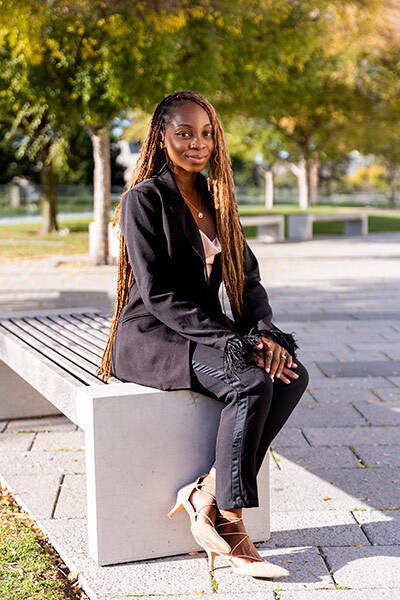By Sarah Weld
 Dayo Ajanaku was burned out. 1L year had dimmed her enthusiasm and she wanted to get it back.
Dayo Ajanaku was burned out. 1L year had dimmed her enthusiasm and she wanted to get it back.
After consulting some practicing lawyers, she shifted her focus to hands-on courses and opportunities. She enrolled in negotiation classes, created an independent study, and discovered the New Business Community Law Clinic — and a renewed purpose.
“I am putting myself in positions where I’m learning things I want to learn, but also getting skills and tools I can use,” says Ajanaku, who also served as the Sports and Entertainment Law Society’s alumni chair and the Law Students of African Descent’s co-president and 1L representative.
Over two semesters with the clinic, she worked with over a dozen small businesses, including three that resonated with her deeply — a Berkeley film company, a nonprofit supporting Black farmers, and a mental health consulting company.
“They all touched on a part of my identity, what’s important to me, and what I want to pursue,” says Ajanaku, who envisions working as a general counsel for a Black-owned entertainment company.
She and her clinic teammates helped the film company secure the proper legal protections to produce its first independent film festival. They also helped a California organization that invests in Black food economies and supports prison-impacted Black mothers and caregivers form a worker-directed nonprofit and apply for a trademark.
“They’re giving these women jobs and skills to survive,” says Ajanaku. “As a Black woman, I have a strong desire to see people in my community thrive beyond just surviving.”
Toward that end, Ajanaku also shares her experience as a Black woman at Berkeley Law on YouTube and has an Instagram account (TheBlackEnneagram) about a personality tool for people who identify as Black and brown.
At the consulting company, which helps employers respond better to workers’ mental health needs, Ajanaku helped set up a limited liability company, developed subscription and services agreements, and website terms of use and privacy policies.
She says the personal one-on-one connections with her clients gave her the motivation and spark she had missed as a 1L.
“It feels good to know that giving them these tools and skills will have a lasting impact on their business,” says Ajanaku, who cites drafting contracts and emails, working on a legal team, and giving presentations as critical skills she learned in the clinic.
Ajanku also took part in the virtual Villanova Esports Negotiation Competition, where she was one of very few women participants, wrote articles for the Berkeley Business Law Journal on how artificial intelligence affects people of color and the future of musical festivals after the 2021 Astroworld Festival deaths, wrote for the Berkeley Journal of African American Law and Policy, and got involved in the Womxn of Color Collective.
“Before I leave Big Law, I hope someone creates a Black production company that’s doing really well,” says Ajanaku, who is headed to Pillsbury Winthrop Shaw Pittman after graduation. “I would love to work with Issa Rae — that would be a dream job.”